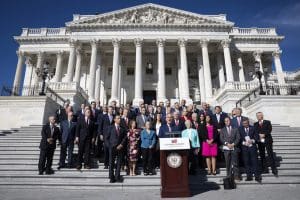GOP plan to cut federal spending could reverse economic gains made under Biden
Experts say the cuts, which could include Medicare and Social Security, will cause an economic decline.

Tactics that Republican leaders say they will use to cut federal spending by blocking an increase in the government’s debt ceiling if they regain a majority in the House of Representatives in November could trigger a recession, reversing recent economic gains, experts say.
The debt ceiling is a legal limit on the amount of money the federal government can borrow.
According to the Bureau of Economic Analysis’ “advance” estimate released on Thursday, the economy grew 2.6% in the third quarter of 2022, beating the Dow Jones forecast of 2.3%. This comes after the economy declined by 1.5% in the first quarter of 2022 and 0.9% in the second.
In a statement released by the White House on Oct. 27, President Joe Biden said:
For months, doomsayers have been arguing that the US economy is in a recession and Congressional Republicans have been rooting for a downturn. But today we got further evidence that our economic recovery is continuing to power forward. … Our economy has created 10 million jobs, unemployment is at a 50 year low, and U.S. manufacturing is booming. Today’s data shows that in the third quarter, Americans’ incomes were up and price increases in the economy came down.
The news about the economy comes a month after a September jobs report from the Bureau of Labor Statistics showed a 3.5% unemployment rate, down from 6.4% when Biden took office. During the peak of the pandemic, the unemployment rate reached 14.7% under former President Donald Trump. Biden has signed multiple pieces of legislation designed to shore up the economy and spark investment and job growth.
House Minority Leader Kevin McCarthy compared the debt ceiling to a “credit card limit” and refused to rule out safety net cuts as part of the Republicans’ efforts to cut government spending.
Economic experts said, however, that refusing to raise the debt limit would have a catastrophic effect on the U.S. economy.
Moody’s Analytics chief economist Mark Zandi said in September 2021 that such tactics could kill as many as 6 million jobs and destroy as much as $15 trillion in household wealth.
The Center on Budget and Policy Priorities estimated that same month that failing to increase the limit would result in a $1.2 trillion shortfall that would “cause serious fiscal problems for states.” Without those funds, it said, federal funding for schools and funding for public transit, road construction, and public health would be at risk of cuts.
Without an increase in the debt ceiling, the government would be unable to send out payments that it owes, military pay would cease, and Social Security and Medicare benefits would not be funded.
The limit has been raised 78 times since 1960 and was most recently raised in 2021.
Biden’s efforts to boost the U.S. economy include the American Rescue Plan, a $1.9 trillion economic stimulus bill he signed in March 2021 that is designed to mitigate the effects of the pandemic. Rescue Plan funds have been sent to the states and, as a February report from the nonprofit Small Business Majority showed, they helped keep millions of small businesses operating.
Biden signed the Infrastructure Investment and Jobs Act in November 2021 after years of the promise of “infrastructure week” being unfulfilled under Trump. The $1.2 trillion bill is financing construction and repair projects across the country, employing thousands of employees, often members of unions, to make long-needed improvements.
The CHIPS and Science Act that Biden enacted in August included incentives for companies to keep high-tech manufacturing in the United States instead of sending such business overseas. Since then, a number of companies have announced projects to build manufacturing facilities that will generate both short-term construction jobs and long-term employment.
In an Oct. 24 speech at Democratic National Committee headquarters in Washington, D.C., Biden said Republicans’ threats were “fiscally reckless.”
Republicans have been very clear: They’ve stated boldly that they want to cut Social Security and Medicare and — to the point that they’ll shut down the government, they say, and send the nation into default, which raises prices for everyone, if we do not cut Social Security and Medicare. I ain’t gonna do it.
Published with permission of The American Independent Foundation
Recommended

Biden calls for expanded child tax credit, taxes on wealthy in $7.2 trillion budget plan
President Joe Biden released his budget request for the upcoming fiscal year Monday, calling on Congress to stick to the spending agreement brokered last year and to revamp tax laws so that the “wealthy pay their fair share.”
By Jennifer Shutt, States Newsroom - March 11, 2024
December jobs report: Wages up, hiring steady as job market ends year strong
Friday’s jobs data showed a strong, resilient U.S. labor market with wages outpacing inflation — welcome news for Americans hoping to have more purchasing power in 2024.
By Casey Quinlan - January 05, 2024
Biden’s infrastructure law is boosting Nevada’s economy. Sam Brown opposed it.
The Nevada Republican U.S. Senate hopeful also spoke out against a rail project projected to create thousands of union jobs
By Jesse Valentine - November 15, 2023












































































